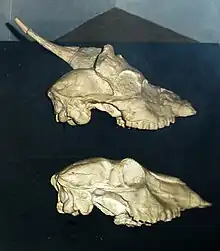| Kipsigicerus Temporal range: | |
|---|---|
 | |
| Skull of Kipsigicerus lobidotus | |
| Scientific classification | |
| Domain: | Eukaryota |
| Kingdom: | Animalia |
| Phylum: | Chordata |
| Class: | Mammalia |
| Order: | Artiodactyla |
| Family: | Bovidae |
| Subfamily: | Bovinae |
| Genus: | †Kipsigicerus Thomas, 1984 |
| Species: | †K. labidotus |
| Binomial name | |
| †Kipsigicerus labidotus Gentry, 1970 | |
| Synonyms[1] | |
|
Protragocerus lobidotus | |
Kipsigicerus is an extinct genus of East African antelope from the Middle Miocene.[2] Its closest living relative is the four-horned-antelope.
It was discovered in Fort Ternan, Kenya and was originally described as a species of Protragocerus. The horn cores were distinct, being highly compressed with eaxh horn growing forward to one another. Because of the unique horn morphology, the genus Kipsigicerus was erected for this species.[3]
Sources
- Classification of Mammals by Malcolm C. McKenna and Susan K. Bell
References
- ↑ "Kipsigicerus". Biolib.
- ↑ Tsujikawa, Hiroshi (December 2005). "The updated late miocene large mammal fauna from Samburu hills, northern kenya" (PDF). African Study Monographs, Supplement. Retrieved 2008-07-27.
- ↑ Bubenik, Anthony B. (2012). Horns, Pronghorns, and Antlers: Evolution, Morphology, Physiology, and Social Significance. Springer New York. p. 202. ISBN 9781461389668.
This article is issued from Wikipedia. The text is licensed under Creative Commons - Attribution - Sharealike. Additional terms may apply for the media files.